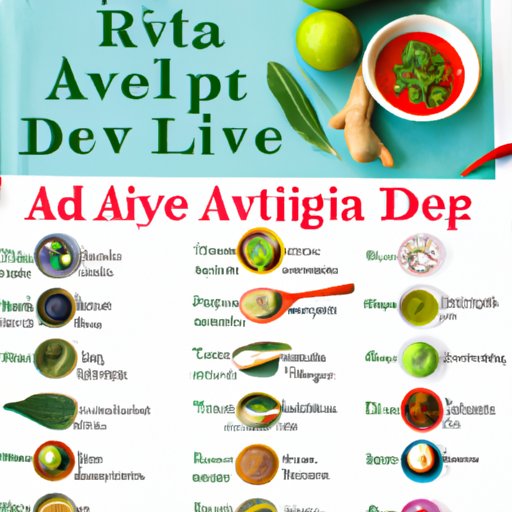Introduction
The Ayurvedic diet is a type of holistic healing method that originated in India thousands of years ago. It is based on the idea that all aspects of life – physical, mental, spiritual – are interconnected and must be in balance for optimal health. The Ayurvedic diet focuses on eating whole, natural foods that nourish the body and promote balance and harmony.
Definition of Ayurvedic Diet
Ayurveda is a Sanskrit word meaning “life knowledge” or “science of life.” The Ayurvedic diet is a holistic approach to health that takes into account the individual’s unique constitution and lifestyle. According to Ayurveda, each person has a unique combination of doshas, or energies, that need to be balanced through diet and lifestyle choices. The goal of the Ayurvedic diet is to achieve optimum health and wellbeing by eating foods that are in harmony with one’s individual constitution.
Overview of Benefits
The Ayurvedic diet has many potential health benefits, including improved digestion, reduced inflammation, increased energy levels, and improved mental clarity. Eating according to your individual constitution can also help to reduce stress and anxiety, improve immunity, and promote overall wellbeing.

Benefits of an Ayurvedic Diet
Eating an Ayurvedic diet can have many positive effects on your health, including:
Improved Digestion
The Ayurvedic diet is designed to promote healthy digestion and absorption of nutrients. It emphasizes eating fresh, whole foods that are easy to digest, such as fruits, vegetables, legumes, grains, and dairy products. Eating these foods in moderation and avoiding processed and overly spicy foods can help keep your digestive system functioning optimally.
Reduced Inflammation
Inflammation is the body’s natural response to injury or infection, but chronic inflammation can lead to a variety of health problems. An Ayurvedic diet can help reduce inflammation by focusing on eating anti-inflammatory foods, such as fruits and vegetables, and avoiding processed foods and refined sugar.
Increased Energy Levels
An Ayurvedic diet can help to increase your energy levels by providing your body with the essential nutrients it needs to function properly. Eating a balanced diet of whole, unprocessed foods will ensure that you get all the vitamins, minerals, and antioxidants your body needs to stay energized throughout the day.
Improved Mental Clarity
The Ayurvedic diet focuses on eating foods that nourish the mind and promote mental clarity. Eating a balanced diet of wholesome foods can help to reduce stress and anxiety, improve concentration, and boost mood.
Foods to Eat on an Ayurvedic Diet
When following an Ayurvedic diet, it is important to focus on eating whole, natural foods that are in harmony with your individual constitution. Here is a list of some of the foods that are recommended on an Ayurvedic diet:
Fruits and Vegetables
Fruits and vegetables should form the foundation of any Ayurvedic diet. They are rich in vitamins, minerals, antioxidants, and fiber, and should be eaten in abundance. Choose organic produce whenever possible, and try to include a variety of colors in your meals.
Legumes and Grains
Legumes and grains are an important source of protein, fiber, and complex carbohydrates. Beans, lentils, quinoa, oats, and brown rice are all excellent sources of nutrition and should be included in an Ayurvedic diet.
Dairy Products
Dairy products, such as yogurt and ghee, are recommended in moderation on an Ayurvedic diet. Dairy products are a good source of calcium, protein, and healthy fats, but should be consumed in moderation.
Spices and Herbs
Spices and herbs are an important part of the Ayurvedic diet. They add flavor to food and can help to improve digestion and reduce inflammation. Popular spices and herbs include turmeric, ginger, cumin, coriander, fennel, and cardamom.
Nuts and Seeds
Nuts and seeds are a great source of healthy fats and protein. They can be added to salads, smoothies, and other dishes for a nutritional boost. Popular nuts and seeds include almonds, walnuts, chia seeds, pumpkin seeds, and flaxseeds.

Recipes for an Ayurvedic Diet
Here are some delicious recipes that are perfect for an Ayurvedic diet:
Breakfast Options
- Chia seed pudding with fresh fruit
- Overnight oats with almond milk
- Vegetable omelet with sprouted grain toast
- Green smoothie with spinach, banana, and almond butter
Lunch and Dinner Options
- Quinoa salad with roasted vegetables
- Vegetable stir-fry with brown rice
- Roasted sweet potato with black beans and avocado
- Coconut curry with cauliflower and lentils
Snacks and Desserts
- Fruit and nut bars
- Trail mix with dried fruit and nuts
- Hummus and vegetable sticks
- Baked apples with cinnamon and walnuts

Tips for Adopting an Ayurvedic Diet
Adopting an Ayurvedic diet can seem overwhelming at first, but there are some simple tips to help make the transition easier:
Start Slow
Don’t try to change your entire diet overnight. Start by making small changes, such as swapping out processed snacks for healthier options or adding more fruits and vegetables to your meals. As you become more comfortable with the diet, you can gradually add more Ayurvedic foods to your meals.
Listen to Your Body
Pay attention to how your body responds to different foods and adjust your diet accordingly. If you find that certain foods cause indigestion or make you feel sluggish, then it may be best to avoid them.
Create a Balance
It’s important to create a balance between the different food groups, rather than focusing on only one type of food. Aim to have a variety of fruits, vegetables, legumes, grains, dairy, and healthy fats in your meals.
Connect with Nature
Being in nature can help to reduce stress and promote wellbeing. Take a walk in the park, go for a hike, or spend time in your garden. Connecting with nature can help to bring balance to your life and will support your Ayurvedic diet.
Conclusion
The Ayurvedic diet is a holistic approach to health that focuses on eating whole, natural foods that are in harmony with one’s individual constitution. This type of diet can have many potential health benefits, including improved digestion, reduced inflammation, increased energy levels, and improved mental clarity. Foods that are recommended on an Ayurvedic diet include fruits and vegetables, legumes and grains, dairy products, spices and herbs, and nuts and seeds. There are also many delicious recipes that are perfect for an Ayurvedic diet. Finally, here are some tips for adopting an Ayurvedic diet: start slow, listen to your body, create a balance, and connect with nature.
(Note: Is this article not meeting your expectations? Do you have knowledge or insights to share? Unlock new opportunities and expand your reach by joining our authors team. Click Registration to join us and share your expertise with our readers.)
